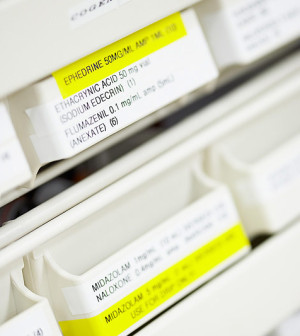- Could Your Grocery Store Meat Be Causing Recurring UTIs?
- Are You Making This Expensive Thermostat Error This Winter?
- Recognizing the Signs of Hypothyroidism
- 10 Strategies to Overcome Insomnia
- Could Artificial Sweeteners Be Aging the Brain Faster?
- Techniques for Soothing Your Nervous System
- Does the Water in Your House Smell Funny? Here’s Why
- Can a Daily Dose of Apple Cider Vinegar Actually Aid Weight Loss?
- 6 Health Beverages That Can Actually Spike Your Blood Sugar
- Treatment Options for Social Anxiety Disorder
Medical Bills Pricey for Americans, Even With Private Insurance


Many Americans may believe that private insurance can keep major medical bills at bay. But a new survey finds that one-fifth of people with private plans still spend at least 5 percent of their income on out-of-pocket health care costs.
The findings, from the research group The Commonwealth Fund, found that 21 percent of adults with health coverage spent 5 percent or more of their income on out-of-pocket costs — not including premiums — over the past year, and 13 percent spent 10 percent or more.
“This survey makes it clear that steadily rising health insurance deductibles and out-of-pocket costs are a serious problem for working people, regardless of how they get their coverage,” study lead author Sara Collins, vice president for Health Care Coverage and Access at The Commonwealth Fund, said in a news release from the group.
The problem was most common among low-income adults, with 41 percent of those who made less than $11,490 a year spending 5 percent or more of their income on out-of-pocket costs, and 31 percent spending 10 percent or more.
Most of the people in The Commonwealth Fund study had employer-sponsored health insurance, while others had Affordable Care Act marketplace plans, individual insurance, Medicaid or some other form of coverage.
The survey also shows that “people who have insurance but have high health care costs relative to their income are as likely to skip getting the care they need as those with no insurance at all,” Commonwealth Fund President Dr. David Blumenthal said in the news release.
Many low- and moderate-income adults with high out-of-pocket costs skipped needed care or medications, the survey found. Among those with yearly incomes of less than $22,980, 46 percent skipped needed care at least once due to their health plan’s copayments or coinsurance, 28 percent did not fill a prescription, 28 percent skipped a medical test or follow-up treatment, 30 percent did not see a doctor when they had a health problem, and 24 percent did not see a specialist when their doctor recommended seeing one.
Among people with private insurance who spent at least 5 percent of their income on out-of-pocket health costs, 40 percent said they skipped needed care at least once due to their plan deductibles, 29 percent skipped a medical test or follow-up treatment, 27 percent did not see a doctor for a health problem, 23 percent skipped a preventive care test, and 22 percent did not see a specialist despite their doctor’s advice to do so.
Overall, 13 percent of adults with private health insurance have plans that include a deductible equal to 5 percent or more of their income, including 25 percent of those with low incomes and 20 percent of those with moderate incomes, the study said.
Forty-three percent of adults said their deductibles are somewhat, very difficult, or impossible to afford, including 58 percent of those making less than $11,490 a year, 64 percent of those making $11,490 to $22,980 a year, 49 percent of those making $22,980 to $45,960 a year, and 27 percent of those making more than $45,960 a year.
“In order for health insurance to work for families, and for the U.S. health care system to work well, it will be important to bring down the number of people who are underinsured — people who have coverage that doesn’t provide adequate financial protection,” Blumenthal said.
“Keeping these costs affordable is part of ensuring that insurance provides true financial protection,” Collins added.
More information
There’s more on health care coverage at healthcare.gov.
Source: HealthDay
Copyright © 2026 HealthDay. All rights reserved.










